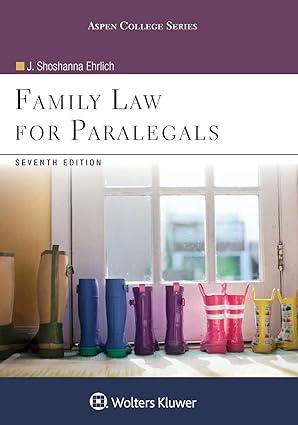The Mississippi Department of Human Services (DHS), on behalf of Diana Goodin-McKay (McKay), sought to enforce an
Question:
The Mississippi Department of Human Services ("DHS"), on behalf of Diana Goodin-McKay ("McKay"), sought to enforce an Arizona child support order against John T. Goodin ("Goodin") in the Chancery Court of Winston County. The chancellor granted DHS' petition, and Goodin has appealed, asserting the following assignments of error. The chancery court lacked personal jurisdiction over Goodin. Goodin and McKay married in Mississippi and later became residents of Arizona where they eventually divorced. Pursuant to the divorce, the Superior Court of Cochise County, Arizona, ordered Goodin to pay \(\$ 776\) in monthly child support for the two unemancipated children born of this marriage. After the divorce, McKay and the two children returned to Mississippi to live. ... Goodin also returned to Mississippi. Goodin, by his own admission, did not pay child support between February 1998 and July 31, 1999. . . Because Goodin had not paid child support in that period, DHS, on behalf of McKay, sought to enforce the Arizona order in Mississippi, filing a Petition to Enforce and Give Full Faith and Credit to a Foreign Child Support Judgment ("Petition") in the Chancery Court of Winston County, Mississippi. Following the filing of the Petition, Goodin appeared before Chancellor Edward Prisock, and with the assistance of counsel opposite, objected to the court's jurisdiction over him [and] ... to service of process.... At the hearing, ... Goodin again objected to the court's jurisdiction, stating that he was a resident of Arizona, not Mississippi.... Goodin reiterated his previous position as to service of process, testifying that he had never been personally served, that service had been left with his mother at her home, and that he did not reside with her.....
Questions:
1. What was the Mississippi Department of Human Services seeking to do in this case?
2. Why did Goodin argue that the court lacked personal jurisdiction over him?
3. Why did he argue that service had been improper?
4. How did the court respond to his arguments? According to the court, what was the connection between service and jurisdiction? What case did the court rely on in reaching its result?
Step by Step Answer:






